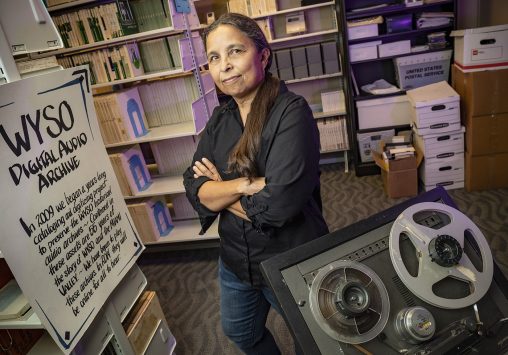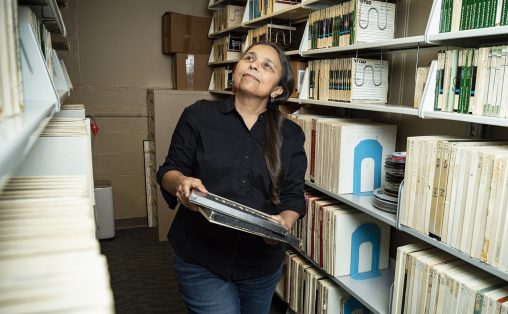
Jocelyn Robinson, who earned a bachelor’s degree and graduate certificate from Wright State, is working to preserve historic audio recordings at historically black colleges and universities. (Photos by Erin Pence)
They are the echoes of history, voices that defined the civil rights and Vietnam War eras. Martin Luther King Jr. Ralph David Abernathy. Clyde Bellecourt. César Chávez. Stokely Carmichael. Susan Sontag. Even members of the radical militant Weather Underground.
For many years, the sound of these history-making voices captured in the region beginning in 1958 was at risk. The voices lived on old and dusty magnetic audio recording tapes stuffed in bags and boxes discovered in a basement storeroom at WYSO Public Radio.
But thanks to a federal grant, the recordings have been saved — stabilized, organized, catalogued and archived in a temperature and humidity-controlled sanctuary at WYSO. And with the help of Wright State University alumna Jocelyn Robinson, this audio collection has a new life.
Robinson, an educator, producer and preservationist, marvels at the riches.
“The voices in this archives are incredible, amazing voices of the times,” she said.
Robinson’s current project is equally ambitious — a treasure hunt of audio recordings made by radio stations at the nation’s historically black colleges and universities.
It began when Robinson attended a conference of the Radio Preservation Task Force sponsored by the Library of Congress in 2016. There, she connected with a community of professionals interested in radio preservation and was asked to serve on the task force’s African American and Civil Rights Radio Caucus.
Robinson discovered that of the 101 historically black colleges and universities (HBCUs), 29 currently have radio stations. She proposed a research project to identify the content and condition of any historical audio recordings and help the stations preserve them. Her project was funded in 2018 by the National Recording Preservation Foundation.
With the help of her mentors and colleagues at Wright State, Robinson first created a questionnaire to build a profile of the stations. Then she began doing site visits. So far she has gone to 12 stations.
“There is some urgency about this,” she said.
If a financially struggling college is forced to sell its FCC license and take its radio station off the air, it could put the preservation of the materials in jeopardy. In addition, many of the HBCU stations are in the Hurricane Alley of Georgia and the Carolinas.
“With climate change and the severity of storms in the Atlantic, the materials at these institutions are at risk,” said Robinson.
Robinson recently made a site visit to the University of the District of Columbia, which once had a radio station. She said it has a treasure trove of jazz recordings, photographs and public affairs programming.
During site visits, Robinson sits down with the station manager and often the school archivist to discuss the project and to find out whether the station’s recordings are being included in the university’s archival collection.
“The whole goal is to be able to be a resource for your campus, a resource for students and faculty, a resource for other researchers and for your community at large,” she said.

Jocelyn Robison manages a multitude of radio production projects at WYSO Public Radio, including “West Dayton Stories” and “Rediscovered Radio.”
Robinson said that even though all of the stations have music formats, many of them kept listeners apprised of news and events in their communities, particularly from the civil rights era and forward.
“The real important aspect of this work is to help these communities with their place memory and their legacies,” she said.
So far, Robinson has not uncovered a lot of audio. Determining the reason for that is part of the project. But she is not discouraged.
“I have not found that real gem of a recording yet, but I know they are still out there,” she said.
After graduating from Yellow Springs High School in 1974, Robinson came to Wright State, attracted by its proximity and affordability.
She majored in both theatre and dance before settling on art history with a concentration in gallery management and museology. She had a work-study job at the university’s art gallery.
“I got to be in contact with major contemporary artists because the exhibition program at the time was cutting-edge,” she said.
After graduating with her bachelor’s degree in 1987, Robinson was hired by the soon-to-open National Afro-American Museum and Cultural Center in Wilberforce, where she helped design pre- and post-tour materials and wrote labels on the original exhibits.
In the early 1990s, Robinson was named executive director of the Association of African American Museums and for five years organized conferences and wrote grants for the museums.
“I have this administrative superpower,” she said.
Along the way Robinson earned her master’s degree in cultural studies with a concentration in race, gender and identity at Antioch University. Her thesis was titled “Not Your Tragic Mulatta: Self Definition and Identity in Mixed Race Women.”
Then it was on to Central State, where she worked as director of the Title III grant program, helping administer several million dollars of federal funding to the university.
In 2013, Robinson began getting radio production and audio-storytelling experience by taking a Community Voices course at WYSO. For her class project, she used the archival audio from the WYSO collection.
“My piece had such an impact that I got bitten by the bug,” she said.
Robinson became the station’s first Archives Fellow and produced a series of short documentaries called “Rediscovered Radio.”
“I learned as I went,” she said. “I did standups. I did interviews. I did oral histories. I did all the scripting, voicing and mixing too.”
Robinson also returned to Wright State, where in 2016 she earned a graduate certificate in archives and records management through the Public History track offered by the Department of History so she could be fluent in the language of archives.
“The faculty in the Public History Program at Wright State are all working archivists and are amazing and inspiring,” she said. “I feel both blessed and privileged to have been educated by them.”
Robinson teaches at Antioch University and has an office at WYSO, where she manages a multitude of radio production projects.
She is working on “West Dayton Stories,” gathering oral histories of elderly residents and training a team of community producers who will tell a wide variety of stories to amplify the voices of the community.
“I have this credo and it is this,” she said, “I need to do stimulating work that does good.”

 Wright State student-athletes make a lasting impact on local family, more to come
Wright State student-athletes make a lasting impact on local family, more to come  Wright State names Rajneesh Suri dean of Raj Soin College of Business
Wright State names Rajneesh Suri dean of Raj Soin College of Business  ‘Only in New York,’ born at Wright State
‘Only in New York,’ born at Wright State  Wright State president, Horizon League leaders welcome new commissioner
Wright State president, Horizon League leaders welcome new commissioner  Wright State celebrates homecoming with week-long block party
Wright State celebrates homecoming with week-long block party 